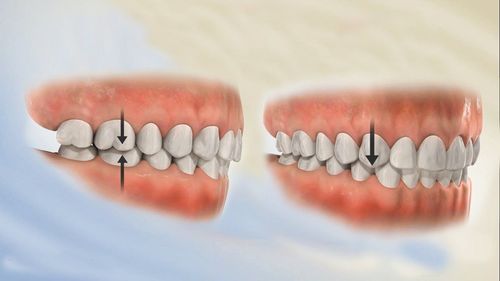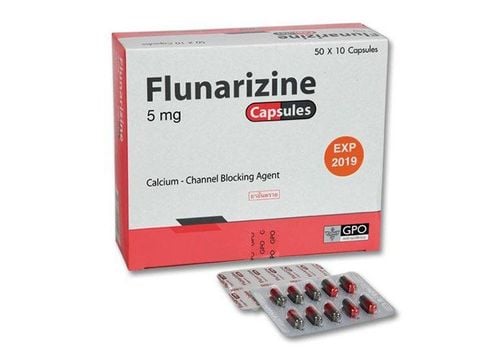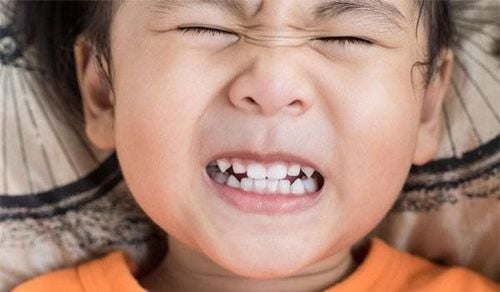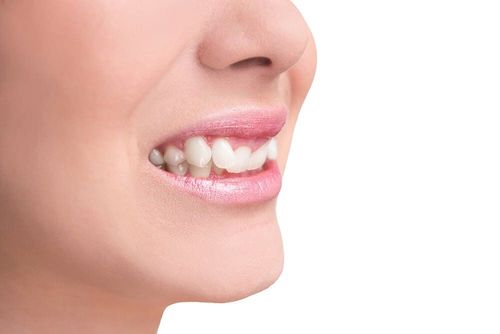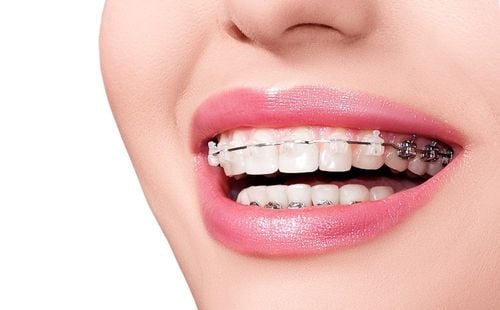This is an automatically translated article.
Children sleep constantly moving their mouths with a clicking sound or teeth rubbing together. These are signs that your child is grinding his teeth. What causes teeth grinding in toddlers?
1. What causes teeth grinding in toddlers? Teeth grinding is a condition in which two teeth frequently grind together. This pathology can affect infants, children and adults. Teeth grinding usually occurs at night, but it can also appear during the day. You also do not have to worry too much because most cases are mild and do not require treatment. Symptoms of teeth grinding include:
Teeth grinding or clenching Hearing grinding teeth Broken or worn teeth Jaw pain or pain Ear pain Headaches near the temples Teeth grinding can happen throughout life for different reasons. According to the University of Michigan Health System, children can start grinding their teeth at 6 months or later when their teeth start to come in and when they are 5, when their permanent teeth start coming in.
Adults may grind their teeth due to stress or anxiety. When it comes to toddlers, the causes often have more to do with testing out their new teeth. Although most toddlers have this habit, there are some cases where you may need to seek out additional treatments to protect your child's teeth.
According to the Nemours Foundation, it is estimated that 2 to 3 in 10 children grind their teeth. Teeth grinding is most common when babies sleep, but you may notice them doing it during the day, too.
Dentists don't always know the reason why toddlers grind their teeth. Some possible reasons for this phenomenon are:
Toddler's teeth are not aligned properly. Toddlers grind their teeth as a way to relieve pain, such as an earache or discomfort from teething. Due to cerebral palsy High use of antibiotics For older children, teeth grinding can be a sign of stress or anxiety. Sometimes you or your doctor may not be able to pinpoint the exact cause.

Tật nghiến răng ở trẻ mới biết đi thường vô hại
2. What are the effects of bruxism in children? For the most part, teeth grinding is not considered a harmful habit. Sometimes the biggest influence is parents worried about the grinding sound the baby is making.
For other children, teeth grinding can cause jaw pain. While your baby may not be able to tell you that's the exact cause of their discomfort, frequent jaw rubbing can be an indication of this.
3. Children grind their teeth, when should they go to the doctor? If you hear your child grinding their teeth most days of the week, parents should make an appointment with the dentist. The dentist will look at your child's teeth for signs of wear and tear, such as chipped enamel or teeth that appear broken or cracked. The dentist will also check for misalignment of the teeth, which can indicate why your child is grinding.
Although teeth grinding in toddlers is usually harmless, always make an appointment with your dentist if you are concerned about this.

Phương pháp điều trị điển hình cho tình trạng nghiến răng ở trẻ mới biết đi là không có phương pháp điều trị nào cả
4. Treatments for teeth grinding in toddlers In older children, bruxism that causes significant pain or misaligned teeth is often treated with a night guard such as a mouth guard. teeth grinding. These are thin, flexible pieces of plastic that are placed over the teeth to protect them from damage. However, a toddler's teeth are constantly changing, which affects his ability to fit.
One "treatment" that you shouldn't use is to wake your baby up to the sound of teeth grinding. This can worsen symptoms and may affect a child's ability to have a good night's sleep.
The typical treatment for toddler teeth grinding is no treatment at all. If you suspect stress or anxiety may be a potential cause, you can try to establish good habits for your baby such as: reading to your baby before bedtime, holding her in your arms... to help her feel better. feel comfortable before falling asleep.
Please dial HOTLINE for more information or register for an appointment HERE. Download MyVinmec app to make appointments faster and to manage your bookings easily.





